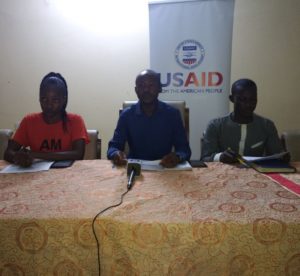Text of a Press Conference Addressed by Hamza Ibrahim, Coordinator, Countering Hate Speech Project, Centre for Information Technology and Development (CITAD)
Date: 23rd October, 2019.
Venue: Conference Hall, Matho Crystal Hotel, Yenagoa, Bayelsa state.
Introduction
 Hate speech is a major problem that tends to undermine peaceful co-existence among Nigeria’s diverse communities and threatens the political stability of the country. Hate speech is particularly widely spread in the social media. With increasing reach of social media and its high speed of delivery as well as its relative affordability, the danger that hate speech can easily catalyze large scale violence is real. There have already been instances in which hate speech had already occurred before and during the 2019 general election. And as we approach gubernatorial election here in Bayelsa state, it is instrumental that awareness is intensified to ensure that people desist from hate speech and violence against women particularly in the social media space in order to have peaceful election and continued peace in the country.
Hate speech is a major problem that tends to undermine peaceful co-existence among Nigeria’s diverse communities and threatens the political stability of the country. Hate speech is particularly widely spread in the social media. With increasing reach of social media and its high speed of delivery as well as its relative affordability, the danger that hate speech can easily catalyze large scale violence is real. There have already been instances in which hate speech had already occurred before and during the 2019 general election. And as we approach gubernatorial election here in Bayelsa state, it is instrumental that awareness is intensified to ensure that people desist from hate speech and violence against women particularly in the social media space in order to have peaceful election and continued peace in the country.
About the Project
The Centre for Information Technology and Development (CITAD) is implementing Countering Hate Speech Project in Nigeria with support from National Democratic Institute (NDI). The project tracks and counters hate speech and online violence against women with a view to raising awareness as well as campaign and advocacy towards addressing the consequences of the phenomena. Bearing in mind that the population of Nigerians on social media platforms is speedily growing, and the online visibility of conventional media also gives room for discussion, hate speech and online violence against women are sadly becoming rampant. It is against this background that CITAD implements the project.
From Our Observatory (Monitoring Platform)
As the gubernatorial election scheduled for November 16th here in Bayelsa state continues to approach, we, the Centre for Information Technology and Development (CITAD), have monitored and tracked a total number of four hundred and twenty (420) hate speech online violence against women items from different social media platforms-Facebook, Twitter, blogspots and websites of conventional and online newspapers. On social media, the speech items were tracked from groups, pages and individual posts on Facebook, on Twitter from tweets and replies to tweets. On webpages of conventional and online newspapers as well as blogspots, the speech items emerged from the comments sections. The speech items tracked also included those done offline particularly under election category in Bayelsa state. Presented below is the breakdown of the speech items based on category, medium and gender of the perpetrators.
Speech Category
- Access to resources——————————————–97 (23%)
- Biafra-agitation related—————————————-16 (4%)
- Election-related————————————————–64 (15%)
- Ethnic-based—————————————————–85 (20%)
- Issues of attention———————————————–40 (10%)
- Gendered hate speech—————————————–88 (21%)
- Religious hate speech——————————————18 (4%)
- Others————————————————————–12 (3%)
Total ————————————————————————420 (100%)
Medium of the Speech
- Blogs—————————————————————-8 (2%)
- Facebook———————————————————-239 (57%)
- Twitter————————————————————–152 (36%)
- Newspapers——————————————————21 (5%)
Total————————————————————————420 (100%)
Gender of the Perpetrators
- Male————————————————————–353 (84%)
- Female———————————————————–43 (10%)
- Don’t Know——————————————————24 (6%)
Total———————————————————————-420 (100%)

Leave a Reply